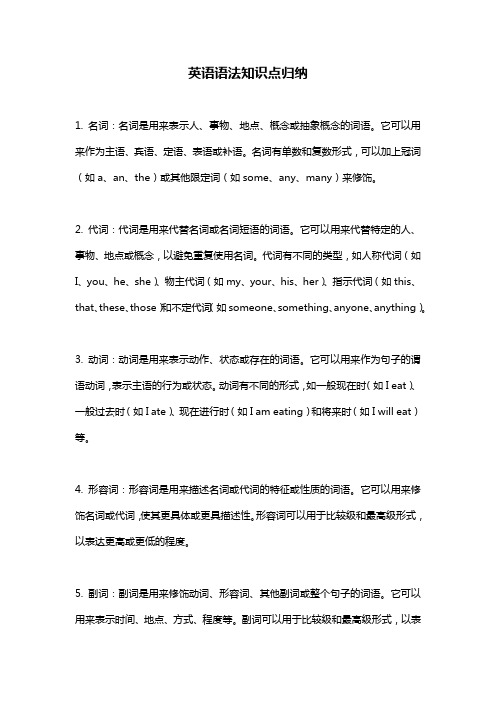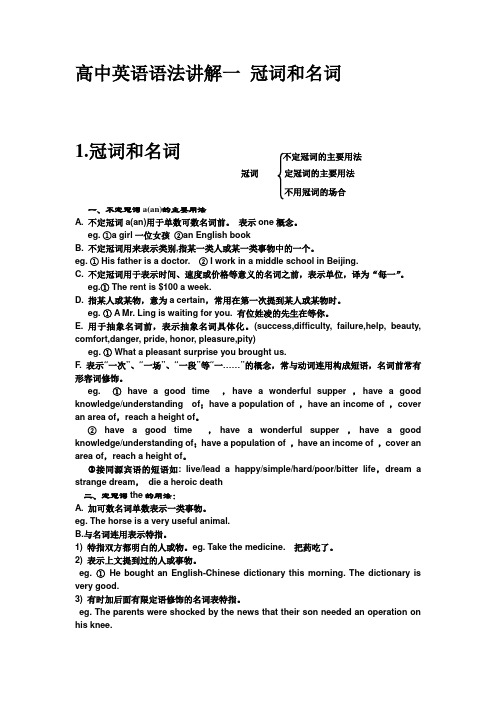英语语法总结冠词和名词
- 格式:doc
- 大小:37.00 KB
- 文档页数:6

初中英语语法知识:名词与冠词1.a 用在辅音因素开头的单数可数名词前;an用于元音因素开头的单数可数名词前。
2.表示乘坐交通工具时,注意by 后不带冠词,on 或in 后面可以加冠词或其他限定词。
如:by bike ,on his /a bike3.某些短语中有无定冠词the表达的意义不同。
例如:be in hospital 住院,be in the hospital在医院。
go to school 无上学,go to the school 去学校。
4.“the +形容词”表示一类人the old =the old people ,the rich =rich people .5.“the +姓氏的复数”表示一家人。
The Browns :Brown 一家人6.加the的情况①序数词和形容词最高级前②方位乐器前③江河湖泊海洋等名词前④next ,last , same , only 等此前⑤第一无二的天体名词前⑥由普通名词构成的转悠名词前请在下列横线中填入适当的冠词。
1.___ old man behind Mary is ___ university teacher.2.Are you good at playing ____ basketball or playing ___ piano?3._____ youngest leader in China is ___ man called Lu Hao .4.How do you go to __ work?I usually take ___ bus .5.What ___ useful dictionary !And ____ dictionary was bought in Tianhe Bookstore.6.He is ___ university student and he comes from ____ island in England .7.-Have you seen the key to ___ car ?-I think ___ key is on the desk .8.-How far is it from our school to ___ seaside? -It is ___ eight – kilometer walk from here .9.I have got ___ bad headache all day ,so I think I’ll go to bed early .10.If you go by ___ train ,you can have quite a comfortable trip ,but make sure you get __ fast one .11.She has been in ___hospital for three days .We go to ___ hospital to see her every day .12.There is ____ book on the shelf .Would you please get ___book for me ?13.Learning ____ country’s language is a better way of knowing ____culture behind it .14.I hope we can fly to ___moon one day .7.数词加名词作定语时,有两种表达。

大学英语语法总结(全面)大学英语语法总结(全面完整版)1. 介词(Prepositions)- 表示地点:at, in, on- 表示时间:at, in, on- 表示方式:by, with- 表示原因:because of, due to- 表示目的:for, to2. 冠词(Articles)- 定冠词:the- 不定冠词:a, an3. 代词(Pronouns)- 主格代词:I, you, he, she, it, we, they- 宾格代词:me, you, him, her, it, us, them- 所有格代词:my, your, his, her, its, our, their- 反身代词:myself, yourself, himself, herself, itself, ourselves, themselves4. 名词(Nouns)- 单数名词:book, chair, dog- 复数名词:books, chairs, dogs- 不可数名词:water, money, information5. 动词(Verbs)- 一般现在时:I walk, you walk, he/she/it walks, we walk, they walk- 一般过去时:I walked, you walked, he/she/it walked, we walked, they walked- 现在进行时:I am walking, you are walking, he/she/it is walking, we are walking, they are walking- 过去进行时:I was walking, you were walking, he/she/it was walking, we were walking, they were walking- 一般将来时:I will walk, you will walk, he/she/it will walk, we will walk, they will walk6. 形容词(Adjectives)- 描述名词特征:big, small, tall- 比较级:bigger, smaller, taller- 最高级:biggest, smallest, tallest7. 副词(Adverbs)- 表示方式:quickly, slowly- 表示程度:very, extremely- 表示时间:now, yesterday8. 连词(Conjunctions)- 表并列:and, or- 表递进:furthermore, moreover- 表转折:however, but- 表原因:because, since以上是大学英语语法的简要总结,希望对你有帮助。

冠词知识点总结一、概念冠词是虚词,它置于名词之前,限定名词的意义。
冠词可分为定冠词,不定冠词和零冠词三类。
二、不定冠词的用法1)表示“一个”,意为one;指某人或某物,意为a certain。
A Mr. Ling is waiting for you.2)代表一类人或物。
A knife is a tool for cutting with.3)词组或成语。
a little / a few / a lot / a great many / many a / as a rule / in a hurry / in a minute / in a word / in a short while / after a while / have a cold / have a try / keep aneye on / all of a sudden三、定冠词的用法1)特指双方都明白的人或物:Take the medicine.2)上文提到过的人或事:He bought a house. I’ve been to the house.3)指世上独一无二的事物:the sun, the sky, the moon, the earth4)单数名词连用表示一类事物,如:the dollar ; the fox ;或与形容词或分词连用,表示一类人:the rich; the living 。
5)用在序数词和形容词的最高级形式及形容词only, very, same等前面:Where do you live? I live on the second floor.6)与复数名词连用,指整个群体:They are the teachers of this school.(指全体教师)They are teachers of this school. (指部分教师)7)表示所有,相当于物主代词,用在表示身体部位的名词前:She caught me by the arm.8)用在某些由普通名词构成的国家名称、机关团体、阶级等专有名词前:he People’s Republic of China9)用在表示乐器的名词之前: She plays the piano.10)用在姓氏的复数名词之前,表示一家人(或夫妇俩):the Greens11) 用在惯用语中:in the day, in the morning (afternoon,evening), the day after tomorrowthe day before yesterday, the next morning,in the sky (water,field,country)in the dark, in the rain, in the distance,in the middle (of), in the end,on the whole, by the way, go to the theatre四、零冠词的用法1)国名,人名前通常不用定冠词:England,Mary;2)泛指的复数名词,表示一类人或事物时,可不用定冠词;They are teachers.3)抽象名词表示一般概念时,通常不加冠词;Failure is the mother of success.4)物质名词表示一般概念时,通常不加冠词,当表示特定的意思时,需要加定冠词;Man cannot live without water.5)在季节、月份、节日、假日、日期、星期等表示时间的名词之前,不加冠词;We go to school from Monday to Friday.6)在称呼或表示官衔,职位的名词前不加冠词;The guards took the American to General Lee.7)在三餐、球类运动和娱乐运动的名称前,不加冠词如:have breakfast,play chess8)当两个或两个以上名词并用时,常省去冠词;I can’t write without pen or pencil.9)当by 与火车等交通工具连用,表示一种方式时,中间无冠词;如:by bus,by train;10)有些个体名词不用冠词;如:school,college,prison,market,hospital,bed,table,class,town, church,court 等个体名词,直接置于介词后,表示该名词的深层含义;go to hospital11)不用冠词的序数词;a. 序数词前有物主代词That’s his thirtieth birthday.b. 序数词作副词 He came first in the race.c. 在固定词组中 at (the) first, first of all, from first to last常见考法1.名词前不定冠词的用法;2.不用冠词的特殊情况;3对冠词与主谓一致的考查;4.定冠词与形容词、分词连用表一类人;5.冠词与姓氏的连用;6.有无冠词的意义及区别;7.冠词与such, so how, what等词的位置关系。

英语语法知识点总结英语语法知识点总结英语语法是学习英语的重要基础,掌握英语语法可以帮助我们更好地理解英语,更准确、更流利地表达自己的思想。
以下是一些常见的英语语法知识点的总结,供大家参考。
一、名词名词表示人、事、物、地方等概念,在句子中可以作主语、宾语、表语或定语等。
常见的名词有可数名词和不可数名词。
1. 可数名词:表示可数的单个事物或物品,可以用一个数词表示,如apple(苹果)、book(书)等。
2. 不可数名词:表示不可数的物品和抽象概念,不能用一个数词表示,如water(水)、love(爱)等。
二、代词代词可以替代名词或名词短语,在句子中充当主语、宾语、表语或定语等。
代词包括人称代词、物主代词、反身代词、指示代词等。
1. 人称代词:分为主格和宾格,主格用于做主语或表语,宾格用于做宾语,如I(我)、you(你)、he(他)等。
2. 物主代词:表示所有关系,在句子中修饰名词,如my (我的)、your(你的)、his(他的)等。
3. 反身代词:表示自己或彼此,在句子中充当宾语或介词的宾语,如myself(我自己)、ourselves(我们自己)等。
4. 指示代词:用于指示人或物,在句子中作主语、宾语或定语,如this(这个)、that(那个)等。
三、动词动词是表示动作或状态的词,可以用来构成谓语。
动词分为不及物动词和及物动词。
不及物动词可以单独构成谓语,如sleep(睡觉),而及物动词需要与宾语共同构成谓语,如read a book(读一本书)。
动词的时态包括一般现在时、一般过去时、现在进行时、过去进行时、将来时等。
动词的语态包括主动语态和被动语态。
四、形容词形容词是修饰名词或代词的词,可以指示大小、颜色、形状、性质等特征。
形容词位于名词前面,如big(大)、green (绿色)等。
形容词的比较级和最高级用于比较两个或多个事物的大小或程度,比较级通常在词尾加-er,如bigger(更大的),最高级通常在词尾加-est,如biggest(最大的)。

英语语法知识点归纳1. 名词:名词是用来表示人、事物、地点、概念或抽象概念的词语。
它可以用来作为主语、宾语、定语、表语或补语。
名词有单数和复数形式,可以加上冠词(如a、an、the)或其他限定词(如some、any、many)来修饰。
2. 代词:代词是用来代替名词或名词短语的词语。
它可以用来代替特定的人、事物、地点或概念,以避免重复使用名词。
代词有不同的类型,如人称代词(如I、you、he、she)、物主代词(如my、your、his、her)、指示代词(如this、that、these、those)和不定代词(如someone、something、anyone、anything)。
3. 动词:动词是用来表示动作、状态或存在的词语。
它可以用来作为句子的谓语动词,表示主语的行为或状态。
动词有不同的形式,如一般现在时(如I eat)、一般过去时(如I ate)、现在进行时(如I am eating)和将来时(如I will eat)等。
4. 形容词:形容词是用来描述名词或代词的特征或性质的词语。
它可以用来修饰名词或代词,使其更具体或更具描述性。
形容词可以用于比较级和最高级形式,以表达更高或更低的程度。
5. 副词:副词是用来修饰动词、形容词、其他副词或整个句子的词语。
它可以用来表示时间、地点、方式、程度等。
副词可以用于比较级和最高级形式,以表达更高或更低的程度。
6. 介词:介词是用来表达名词或代词与其他词之间关系的词语。
它通常用来表示位置、方向、时间、原因、目的等。
介词通常位于名词短语的前面。
7. 冠词:冠词是用来限定名词的词语。
它可以是不定冠词(如a、an)或定冠词(如the)。
不定冠词用于泛指某个事物,而定冠词用于特指某个事物。
8. 句子结构:句子由主语、谓语和可能的宾语、定语、状语等构成。
主语是句子的中心,谓语是主语的动作或状态,宾语是动作的对象,定语是对名词或代词的修饰,状语是对动词、形容词或副词的修饰。

高中英语语法讲解一 冠词和名词1.冠词和名词一、不定冠词a(an)的主要用法A. 不定冠词a(an)用于单数可数名词前。
表示one 概念。
eg. ①a girl 一位女孩 ②an English bookB. 不定冠词用来表示类别,指某一类人或某一类事物中的一个。
eg. ① His father is a doctor. ② I work in a middle school in Beijing.C. 不定冠词用于表示时间、速度或价格等意义的名词之前,表示单位,译为“每一”。
eg.① The rent is $100 a week.D. 指某人或某物,意为a certain ,常用在第一次提到某人或某物时。
eg. ① A Mr. Ling is waiting for you. 有位姓凌的先生在等你。
E. 用于抽象名词前,表示抽象名词具体化。
(success,difficulty, failure,help, beauty, comfort,danger, pride, honor, pleasure,pity)eg. ① What a pleasant surprise you brought us. F. 表示“一次”、“一场”、“一段”等“一……”的概念,常与动词连用构成短语,名词前常有形容词修饰。
eg. ① have a good time ,have a wonderful supper ,have a good knowledge/understanding of ;have a population of ,have an income of ,cover an area of ,reach a height of 。
② have a good time ,have a wonderful supper ,have a good knowledge/understanding of ;have a population of ,have an income of ,cover an area of ,reach a height of 。
英语名词与冠词的用法归纳一、名词的基本用法名词是指用来表示人、事、物、地点等具体或抽象概念的词语。
在英语语法中,名词有一些基本的用法,包括单数形式、复数形式、所有格等。
1. 单数形式名词的单数形式用来表示一个人、事物或概念。
例如:cat(猫)、book(书)、idea(想法)等。
2. 复数形式名词的复数形式用来表示多个人、事物或概念。
通常在名词的末尾加上's'或'es'来表示复数。
例如:cats(猫们)、books(书们)、ideas (想法们)等。
3. 所有格名词的所有格形式用来表示所属关系或归属关系。
通常在名词的末尾加上"'s"或"'"来表示所有格。
例如:John's book(约翰的书)、the dog's tail(狗的尾巴)等。
二、冠词的用法冠词是用来限定名词的词语,包括不定冠词"a"和"an",以及定冠词"the"。
1. 不定冠词"a"和"an"不定冠词"a"和"an"用来表示泛指或不确定的人、事物或概念。
通常用"a"来修饰以辅音音素开头的单数名词,用"an"来修饰以元音音素开头的单数名词。
例如:a cat(一只猫)、an apple(一个苹果)等。
2. 定冠词"the"定冠词"the"用来表示特指或已知的人、事物或概念。
它可以修饰单数名词、复数名词以及不可数名词。
例如:the cat(那只猫)、the books(那些书)等。
三、名词与冠词的特殊用法除了基本的名词和冠词用法之外,还有一些特殊的用法需要注意。
1. 特指某个领域或行业的名词在某些特定的领域或行业中,名词前面会使用定冠词"the"来表示该领域或行业的特定事物。
英语语法总结冠词和名词英语语法复习知识扼要总结版Chapter 1简单句(Simple Sentences)1.一.名词的格:of 属格的构成及逻辑语义关系1.1 of属格的构成基本构成:N1+of+N2。
N表示名词;一般来说,of属格主要用于以下两种情形:一是,表示无生命物体的名词的所有关系。
比如:eg:the roof of the church教堂的屋顶/the name of the song 歌曲的名字/the title of the book 书名/the leg of the table 因此,总体来说,’s所有格主要用于有生命的名词,而of属格主要用于无生命的名词二是,当有生命的名词后面接短语或从句修饰时,也用of属格。
比如:eg:I took the advice of an old man that I met during a journey and decided to make something of myself.译文:我听从了在一次旅行中遇到的一位老人的建议,决定干出一番大事业。
1.2of属格的逻辑语义关系介词of可以表示很多种逻辑语义关系,读者最熟悉的应该是它表示的“所有关系”,译成“......的”。
比如:eg:The mother of the boy in a red suit is president of our company.穿红色西服的那个男孩的妈妈是我们公司的总经理。
除此以外,of还可以表示其他语义关系,共计十余种,这里只讨论三种:主谓关系、动宾关系和同位关系。
A.主谓关系:从右往左翻译基本结构:N1+of+N2。
N表示名词;一般来说,这里N1是由不及物动词变化过来的名词,表示某个行为,这一行为是由N2来发出的。
或者说N2是N1行为的执行者。
比如:eg:the arrival of my mother【点睛】:这里第一个名词arrival是由不及物动词arrive变化过来的,它表示一个行为;而第二个名词my mother则是这个行为的执行者,即相当于说my mother arrived.译文:我妈妈到了eg:the rise of the U.S. Superpower超级大国美国的兴起/the growth of agriculture农业增长B.动宾关系:从左往右翻译基本结构:N1+of+N2。
冠词英语中的冠词用法总结冠词是英语语法中非常重要的一部分,用来限定或者指示名词的范围。
在英语中,有三种冠词:定冠词(the)、不定冠词(a/an)和零冠词(没有冠词)。
本文将对这三种冠词的用法进行总结和解释。
一、定冠词(the)的用法:1. 特指某一个人或物:当我们想要指出特定的人或物时,使用定冠词。
例如:The book on the table is mine.(桌子上的那本书是我的。
)2. 表示特指上文已提及的名词:当我们对上文提到过的名词进行引用时,使用定冠词。
例如:I saw a dog. The dog was barking loudly.(我看到了一只狗。
那只狗正在大声吠叫。
)3. 表示唯一或已知的事物:当我们指的是唯一或已知的事物时,使用定冠词。
例如:The sun rises in the east.(太阳从东方升起。
)4. 表示一类事物:当我们指的是某一类事物时,使用定冠词。
例如:The horse is a beautiful animal.(马是一种美丽的动物。
)二、不定冠词(a/an)的用法:1. 表示泛指或提及某一类人或物:当我们想要泛指某人或某物,或者提及某一类人或物时,使用不定冠词。
例如:I saw a cat on the street.(我在街上看到了一只猫。
)2. 表示某一位(偶尔或新见面的)人:当我们指的是一个具体的人时,使用不定冠词。
例如:There is a woman waiting for you at the reception.(接待处有个女人在等你。
)3. 表示数量不确定的事物:当我们指的是数量不确定的事物时,使用不定冠词。
例如:He needs an hour to complete the task.(他需要一个小时来完成这个任务。
)三、零冠词的用法:1. 表示泛指事物:当我们泛指事物时,不使用任何冠词。
例如:I love reading books.(我喜欢阅读书籍。
英语语法——名词与冠词来源:普特英语名词一.定义什么是名词表示人、事物、地点或抽象概念的名称的词,叫做名词。
如:baby 婴儿time 时间pencil 铅笔socialism 社会主义air 空气Shanghai二.名词的种类英语名词可分为两大类:1.普通名词(mon noun)普通名词是某一类人、某一类事物、某种物质或抽象概念的名称。
如:soldier 士兵water 水pupil 学生health 健康machine 机器pleasure 快乐2.专有名词(proper noun)专有名词是个别的人、团体、地方、机构或事物的名称。
其中实词的第一个字母必须大写。
如:Lei Feng 雷锋Karl Marx 卡尔•马克思London 伦敦China 中国The munist Party of China中国共产党The Great Hall of the People人民大会堂The Ministry of Foreign Affairs外交部1.1普通名词的种类普通名词可进一步分为:1)类名词(class noun)类名词表示人或事物属于某一类。
如:tractor 拖拉机panda 熊猫factory 工厂teacher 教员2)集体名词(collective noun)集体名词是一些人或物的总称。
如:class 阶级,班herd 兽群crowd 人群army 军队3)物质名词(material noun)物质名词表示物质或不具备确定形状和大小的个体的实物。
如:steel 钢gram 粮食fire 火cotton 棉花4)抽象名词(abstract noun)抽象名词表示动作、状态、品质或其他抽象概念。
如:happiness 幸福life 生活work 工作whiteness 白色三.名词的数名词又可分为可数名词(countable noun)与不可数名词(uncountable noun)。
英语语法复习知识扼要总结版Chapter 1简单句(Simple Sentences)1.一.名词的格:of 属格的构成及逻辑语义关系1.1 of属格的构成基本构成:N1+of+N2。
N表示名词;一般来说,of属格主要用于以下两种情形:一是,表示无生命物体的名词的所有关系。
比如:eg:the roof of the church教堂的屋顶/the name of the song歌曲的名字/the title of the book 书名/the leg of the table因此,总体来说,’s所有格主要用于有生命的名词,而of属格主要用于无生命的名词二是,当有生命的名词后面接短语或从句修饰时,也用of属格。
比如:eg:I took the advice of an old man that I met during a journey and decided to make something of myself.译文:我听从了在一次旅行中遇到的一位老人的建议,决定干出一番大事业。
1.2of属格的逻辑语义关系介词of可以表示很多种逻辑语义关系,读者最熟悉的应该是它表示的“所有关系”,译成“......的”。
比如:eg:The mother of the boy in a red suit is president of our company.穿红色西服的那个男孩的妈妈是我们公司的总经理。
除此以外,of还可以表示其他语义关系,共计十余种,这里只讨论三种:主谓关系、动宾关系和同位关系。
A.主谓关系:从右往左翻译基本结构:N1+of+N2。
N表示名词;一般来说,这里N1是由不及物动词变化过来的名词,表示某个行为,这一行为是由N2来发出的。
或者说N2是N1行为的执行者。
比如:eg:the arrival of my mother【点睛】:这里第一个名词arrival是由不及物动词arrive变化过来的,它表示一个行为;而第二个名词my mother则是这个行为的执行者,即相当于说my mother arrived.译文:我妈妈到了eg:the rise of the U.S. Superpower超级大国美国的兴起/the growth of agriculture农业增长B.动宾关系:从左往右翻译基本结构:N1+of+N2。
N表示名词;一般来说,这里N1是由及物动词变化过来的名词,与上述“主谓关系”相反,N2是N1行为的承受者,而不是执行者。
比如:eg:America’s invasion of Iraq【点睛】:这里的invasion是由及物动词invade变化过来的,这个短语相当于说America invaded Iraq,即第二个名词Iraq是该动作的承受者译文:美国入侵伊拉克。
eg:a statement of the facts陈述事实C.同位关系基本结构:N1+of+N2,N表示名词;这里N2表示N1的具体内容,二者互为同位说明。
比如:eg:the city of Rome罗马城市/the news of the team’s victory该队胜利的消息二.冠词2.1不定冠词a/an不定冠词a用在以辅音音素(而非辅音字母)开头的名词;不定冠词an用在以元音音素(而非元音字母)开头的名词。
eg:a boy/a student 这里的[b]和[s]都是辅音eg:a university/ a unique person/an unkind old lady 这里的三个词university,unique和unkind虽然都是以字母u开头,但前两个u读成[ju],是辅音,所以用不定冠词a;而unkind中的u读成[Ʌ],是元音,所以用不定冠词an。
eg:an hour/an honor/an SOS sign/2.2冠词的用法概述正确划分英语名词的可数与不可数对掌握冠词的用法至关重要。
将普通名词划分为可数名词和不可数名词是正确运用冠词的前提。
区分特指与泛指:所谓泛指(generic reference),也叫类指,顾名思义,是表示一类事物,或某类事物的总称。
所谓特指(specific reference),是表示某类事物中的具体某一个或某一些。
eg:The lion is a dangerous animal./ The lion escaped from the zoo.【点睛】在前句中,the lion是表示“狮子”这类动物,而不是指具体的某头狮子。
而后句中,the lion是指具体的一头狮子,即就是这个动物园里的某头狮子。
译文:狮子是一种很危险的动物。
/ 那头狮子从动物园里逃跑了。
eg:The tiger is becoming almost extinct./ The tiger is sleeping in the cage.【点睛】在前句中,我们想到的是“老虎”这类动物,并不是想到特定的一只老虎。
在后句中,我们心里想的是“老虎”这类动物中特定的一只,比如眼前看到的这只老虎。
译文:老虎几乎要灭绝了。
/ 那只老虎正在笼中睡觉。
注意:对于the来说,就是特指和泛指。
定冠词主要用于表示特指的用法,其次才是表示泛指的用法。
但对于不定冠词a/an来说,不能表示特指,主要是用来表示泛指。
2.3英语中四种泛指的表达模式讨论冠词泛指用法时,首先应结合名词的数来分析。
名词从数的角度可以分为不可数名词、复数名词和单数名词。
冠词与这三类名词的不同搭配,就会产生冠词的特指和泛指概念。
一般来说,这三类名词与英语的冠词有四种不同的搭配使用规则,从而衍生出四种不同的模式来表示泛指的意义。
具体来说就是:不可数名词不加冠词表示泛指;复数名词不加冠词表示泛指;单数名词与定冠词the连用可以表示泛指;单数名词与不定冠词a/an 连用表示泛指。
2.3.1不可数名词不加冠词表示泛指不可数名词在表示泛指时,不可与定冠词the连用。
如果与the连用,此时不可数名词是表示特指。
比如:eg:Life is hard sometimes./ Life is education in itself./ The writer is writing a book about the life of blacks in America./ I am studying the life of Beethoven.【点睛】第一句可以知道这里的life是指整个人类生活,而不是具体指某个人的生活,即表示泛指,所以不能说The life is hard sometimes.(×)。
第二句同第一句。
而在第三句,这里的life专指“美国黑人的生活”,所以是特指,要说出the life。
而第四句中,这里的life专指“贝多芬的生平”,所以是特指,要说成the life。
译文:生活有时会很艰难。
/ 生活本身就是教育。
/ 这位作家正在写一本关于美国黑人生活的书。
/ 我正在研究贝多芬的生平。
eg:Happiness is often the product of honesty and hard work.译文:幸福往往来自诚实与辛勤的工作。
eg:Sugar isn’t very good for you./ Can you pass me the sugar, please?2.3.2复数名词不加冠词表示泛指复数名词同不可数名词一样,在表示泛指时,不可与定冠词the连用。
如果与the连用,此时复数名词是表示特指。
比较下面句子:eg:Books become more and more expensive./ Books fill leisure time for many people./ Put away the books on your desk./ Move the books off that chair and sit down.【点睛】第一句意思是泛指一切书都在涨价,即这里的books是表示泛指,所以不能说The books become more and more expensive.(×)。
第二句同第一句。
在第三句中,这里的books是专指“你桌上的那些书”,所以是特指,要说成the books。
在第四句中,这里的books是专指“椅子上的那些书”,所以是特指,要说成the books。
译文:书变得越来越贵。
/ 对于大多数人来说,书填补了他们很多闲暇的时光。
/ 把你书桌上的那些书都摆整齐了。
/ 把椅子上的书拿开就可以坐了。
eg:Tigers are becoming almost extinct./ Tigers are dangerous animals./ The tigers aresleeping in the cage.注意1:从以上例句发现,表示特指的复数可数名词或不可数名词,它们一般带有各种短语或从句作后置定语,以限定这些名词所指的事物的范围。
如以上句中的on the desk 和of blacks in America等等。
注意2:一般来说,“the+复数名词”不能用作泛指,而只能表示特指。
不过,有两种特殊的表示复数名词概念的结构,是与the连用的,却可以表示泛指:一是“the+国籍名词”,二是“the+形容词”。
具体如下:一.The+国籍名词:该结构是指一个国籍的、一个种族集团的人。
比如:eg:The Chinese are a great people.【点睛】由于Chinese是单复数同形的名词,这里的the Chinese是表示复数的概念,这从谓语动词are可以看出来。
但这里的the Chinese表示的是“整个中国人或中华民族”’即是一个泛指的概念。
译文:中华民族是一个伟大的民族。
eg:The industrious Chinese are admired by their neighbors.译文:勤劳的中国人民为邻邦所钦佩。
当然不是所有的国籍名词都可以这样用,比如我们不能说the German are...。
这样用的国籍名词仅限于以-ese,-sh和-ch结尾的词。
二.The+形容词:表示一类人,是泛指,相当于在形容词的后面省去了people,所以被看作是复数名词,作主语时,谓语要用复数。
比如:eg:The poor are causing the nation’s leaders great concern.【点睛】这里的the poor是复数概念,表示“穷人们”这类人,即是一个泛指的概念,而不是专指某些穷人。
译文:穷困人口正给该国的领导人造成很大的担忧。
eg:The emotionally disturbed and the physically and mentally handicapped need the aid of Society.译文:感情受挫的人以及身心残疾的人都需要社会的救助。